|
|
|
Sort Order |
|
|
|
Items / Page
|
|
|
|
|
|
|
| Srl | Item |
| 1 |
ID:
134088


|
|
|
|
|
| Publication |
2014.
|
| Summary/Abstract |
One reason why Europe went to war in 1914 is that all of the continental great powers judged it a favorable moment for them to fight, and all were more pessimistic about postponing the fight until later. Not only is this historical paradox an interesting puzzle in its own right, but it sheds light on what is arguably the reigning theory of the causes of wars in general: James Fearon's rational bargaining theory. None of Fearon's three main mechanisms-private information, commitment problems, or indivisibility of stakes-can explain the paradox of the universal, simultaneous view of 1914 as a favorable year for war. Two mechanisms that play a marginal role in his analysis, however-bounded rationality in multidimensional power assessments and attempts to mitigate power shifts through coercive diplomacy-help to explain how Europe's powers became trapped in a choice between war now and war later. These mechanisms were set in motion by background strategic assumptions rooted in the culture of militarism and nationalism that perversely structured the options facing Europe's political leaders in 1914. Whereas Fearon's theory assumes that states are paying equal attention to all relevant information, in 1914 each power's strategic calculations produced disproportionate levels of self-absorption in its own domestic concerns and alliance anxieties.
|
|
|
|
|
|
|
|
|
|
|
|
|
|
|
|
| 2 |
ID:
134089
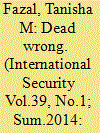

|
|
|
|
|
| Publication |
2014.
|
| Summary/Abstract |
Is war in decline? Recent scholarship suggests that it is. The empirical basis for this argument is a decline in battle deaths over the past several centuries, a standard metric for counting wars and armed conflicts. Dramatic improvements in medical care in conflict zones-in preventive medicine, battlefield medicine, evacuation, and protective equipment-have raised the likelihood of surviving battle wounds today compared with past eras. Thus the fact that war has become less fatal does not necessarily mean that it has become less frequent. Original data on wounded-to-killed ratios, supplemented by medical research and interviews with physicians from the military and nongovernmental communities, is used to advance this claim. The results show that the decline in war is likely not as dramatic as some scholars have argued. These findings question the foundation of existing datasets on war and armed conflict. They also highlight the growing need for policy focused on the battle wounded.
|
|
|
|
|
|
|
|
|
|
|
|
|
|
|
|
| 3 |
ID:
134090
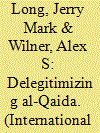

|
|
|
|
|
| Publication |
2014.
|
| Summary/Abstract |
Deterring terrorism is no longer a provocative idea, but missing from the contemporary theoretical investigation is a discussion of how delegitimization might be used to manipulate and shape militant behavior. Delegitimization suggests that states and substate actors can use the religious or ideological rationale that informs terrorist behavior to influence it. In the case of al-Qaida, the organization has carefully elaborated a robust metanarrative that has proved to be remarkably successful as a recruitment tool, in identity formation for adherents, as public apologia and hermeneutic, and as a weapon of war-the so-called media jihad. In the wake of the upheaval of the Arab Spring, al-Qaida and its adherents have redeployed the narrative, promising a new social order to replace the region's anciens régimes. Delegitimization would have the United States and its friends and allies use al-Qaida's own narrative against it by targeting and degrading the ideological motivation that guides support for and participation in terrorism.
|
|
|
|
|
|
|
|
|
|
|
|
|
|
|
|
| 4 |
ID:
134087
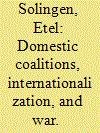

|
|
|
|
|
| Publication |
2014.
|
| Summary/Abstract |
Recent commentary on the centenary of World War I evokes similarities between Germany then and China now, and between globalization then and now. The nature of dominant coalitions in both countries provides a conceptual anchor for understanding the links between internal and external politics in 1914 and 2014. Coalitional dynamics draw greater attention to agency in debates that all too often emphasize structure, impersonal forces, and inevitability. Two core claims rest on this basic analytical building block. First, despite apparent similarities in domestic coalitional arrangements of putative revisionist challengers-Germany and China-important differences defy facile analogies. China now is not Germany then. Second, the regional coalitional cluster and the global political economy-and hence the links between domestic and external politics-differ across the two periods. The "world-time" against which coalitions operate today is significantly different as well. Thus ahistorical analogies between then and now may not only be imperfect; they can infuse actors with misguided and perilous protocols for international behavior. There is plenty that may recall World War I today but even more that does not, and all must make sure that gap never narrows.
|
|
|
|
|
|
|
|
|
|
|
|
|
|
|
|
| 5 |
ID:
134091
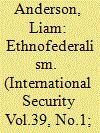

|
|
|
|
|
| Publication |
2014.
|
| Summary/Abstract |
Scholars are divided on the merits of ethnofederalism as an institutional approach to the management of ethnically divided societies. For some, ethnofederalism is a potentially workable compromise between the demands for independence of territorially concentrated ethnic groups and the desire of a common state to preserve its territorial integrity; for critics, it is a short-cut to secession and ultimate state collapse. The argument of critics is theoretically plausible, but an examination of the universe of post-1945 states with ethnofederal arrangements, both failures and successes, shows that ethnofederalism has succeeded more often than it has failed. Within this universe of cases, moreover, ethnofederalism has demonstrably outperformed institutional alternatives, and where ethnofederal systems have failed, they have failed where no institutional alternatives could plausibly have succeeded. The increasing enthusiasm among policymakers and practitioners for prescribing federal solutions to ethnic problems is both understandable and defensible in light of these findings.
|
|
|
|
|
|
|
|
|
|
|
|
|
|
|
|
| 6 |
ID:
134086
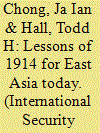

|
|
|
|
|
| Publication |
2014.
|
| Summary/Abstract |
The importance of World War I for understanding contemporary East Asia lies not in the ubiquitous analogy drawn between Anglo-German antagonism and contemporary U.S.-China relations, but rather in the more specific lessons the period preceding its outbreak offers concerning the sources of instability and conflict among states. More precisely, these lessons relate to the challenges posed by complex security arrangements, the dual-edged nature of nationalism, and the dangerous dynamics that can emerge during repeated crises. Appreciating how these factors contributed to mounting tensions and eventually the onset of war in Europe a century ago can enhance efforts to understand and manage tensions in East Asia today.
|
|
|
|
|
|
|
|
|
|
|
|
|
|
|
|
|
|
|
|
|